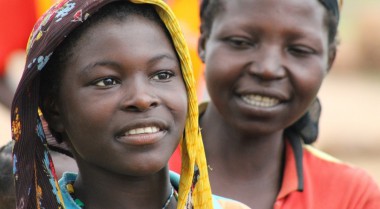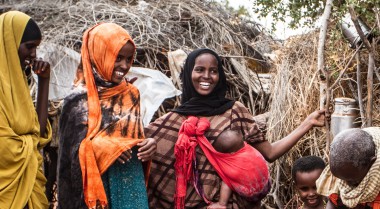
SDGs Bound to Fail Without Meaningful Participation of Civil Society
Two years ago, the UN adopted its 2030 Agenda, including 17 ambitious Sustainable Development Goals. This and next week the world discusses SDG progress in New York City. Senior Cordaid Strategist Peter van Sluijs, who will attend the talks in New York, comes with a clear message. "Without the meaningful participation of civil society, the SDGs and the 2030 Agenda are bound to fail."
In 2015, UN member states adopted 17 sustainable development goals. These MDG successors are the world's call to action to end poverty, protect the planet and ensure everyone enjoys peace and prosperity by 2030. The 2017 high-level political forum from 10 to 19 July in New York City, is the second time UN member states, civil society members, and NGOs gather to check whether member states are on track with the ambitious and transformative 2030 Agenda.
Before leaving for New York City, Peter van Sluijs, who also coordinates the Cordaid hosted Civil Society Platform for Peacebuilding and Statebuilding, shared some of the recommendations he is going to put forward.
"The SDG agenda cannot be implemented nor achieved if civil society – and others, like the private sector – are not thoroughly on board."
Too much at stake to not join hands
"Cordaid works in fragile countries like Afghanistan and South Sudan to help alleviate some of the most appalling forms of poverty and human suffering. Our experience shows", van Sluijs explains, "that the SDG agenda cannot be implemented nor achieved if civil society – and others, like the private sector – are not thoroughly on board. Yes, the 2030 agenda is and should be driven and coordinated by member states. But without meaningful contributions of civil society, the SDGs are bound to fail, just like the previous global agenda of the MDGs has failed. This is why, in New York, we will be pressing hard for a meaningful and ongoing consultation with civil society by member states. Umbrella organizations like the Agency Coordinating Body for Afghan Relief and Development (ACBAR) that brings together 135 national and international NGOs can help in carrying out a coordinated dialogue and consultation with NGOs. Governments must collaborate with civil society experts on gender equality, climate change, health, education and other key SDG topics. Even if these experts look critical towards their own government. There's simply too much at stake to not join hands."
After this plea for partnership and inclusivity, it comes as no surprise that Van Sluijs zooms in on SDG 16, promoting peaceful and inclusive societies and inclusive institutions, as well as SDG 17, pressing for partnership. "They are central to the 2030 Agenda. They are enablers and accelerators for progress in achieving all the other goals."
Strong partnership still lacking on the ground
On the ground, strong and inclusive partnership in process of actualization of the Agenda is still lacking in many cases, according to van Sluijs. "Take the example of Afghanistan. Our Afghan civil society partners and our Cordaid Afghanistan team were supposed to have been involved in SDG consultations some time ago. The Afghan government promised to share the national SDG review for input, but we didn't receive it in time for a thorough discussion that would have enriched the review. So dialogue is taking time to get started. Whereas the SDG agenda is pressingly urgent, especially in fragile settings such as Afghanistan."
Women and youth, often seen to be left out of the dialogue, are often the most inspiring and committed drivers of change in society.
Said Shamsul Islam, our Lobby and Advocacy expert in Afghanistan confirms this. "At country level", he adds, "there is a strong need for a concrete SDG coordination, communication and inclusion mechanism among the government, civil society and the international community."
Inclusion is not only primordial to restore trust in a conflict-affected country like Afghanistan. "Apart from that", van Sluijs continues, "in view of commitments made in the New Deal for Engagement in Fragile States and to keep receiving the much-needed aid support, it is critical for the Afghan government to demonstrate to the international community that achieving the SDGs is the result of a participatory and inclusive process.
Women and youth needed at the table
Women and youth, often seen to be left out of the dialogue, are often the most inspiring and committed drivers of change in society. "That's why they, above all, should have a say in national and international agendas of change such as the SDG agenda", says van Sluijs. In line with for example UN Security Council Resolution 2250 on Youth, Peace, and Security, this is also what Cordaid will be pushing for in New York City. And it will be the main topic of a Cordaid, CSPPS, UNOY side-event in New York City on July 19th (more details below).
Analyzing the national SDG review
Meanwhile Afghanistan's voluntary national review of SDG progress – the eagerly and long-awaited document civil society was supposed to contribute to – was published just a few days ago. The Cordaid Kabul office immediately set up a workshop with civil society partners to discuss it and define recommendations. Just in time to share them during the high-level meeting in New York City this and coming week.
First things first: SDG prioritization
The 2030 SDG agenda is as ambitious as it is all encompassing, with 17 goals ranging from health, and education to clean energy, gender equality and security. "This brings us to the importance of prioritization, " says van Sluijs. "You can't tackle all 17 SDG challenges at once. In a given context you first need to define the most pressing ones. Before implementation plans are rolled out, comprehensive and participatory fragility assessments should map the most pressing issues and needs. This was done by the Afghan government, but no sequencing of actions ensued. What we are waiting for in Afghanistan is concerted follow-up action by all stakeholders, with clear leadership of the government. On the positive side, the Afghan government has organized a side event in New York to discuss partnership in the struggle to eradicate poverty and promote prosperity. Hopefully, this will speed up SDG progress in Afghanistan"
Afghanistan: what are the most urgent steps to be taken?
To keep on track with the 2030 ambitions, these are some of the most urgent things to do according to Said Shamsul Islam:
- Assess who does what (SDG stakeholder analysis);
- Work out clear and concrete annual plans, specifying actions and resources and disseminate them for information and better coordination to avoid duplication/overlapping of efforts and identify aid gaps;
- Strengthen concrete mechanisms for coordination, communication, and inclusion of civil society using, for example, existing coordination organizations like ACBAR and initiatives like Cordaid's Lobbying and Advocacy program Afghanistan;
- Create a forum through initiatives like Cordaid's Lobbying and Advocacy program in which civil society is seen as a trustworthy counterpart in implementing and monitoring the SDG agenda;
- Assure that the SDG process is as inclusive and participatory as possible. Though SDGs are the ultimate responsibility of the government, a multi-stakeholder partnership is needed to achieve truly transformative results.
Cordaid/CSPPS UNDP Youth side-event
Cordaid, CSPPS, UNDP Youth and other partners in the Inter-Agency Working Group on Youth, Peace, and Security organize an HLPF side-event:
The role of young people in promoting peaceful, just and inclusive societies
- Date: 19 July,
- Time: 8:30 to 10 AM,
- Place: UNDP Offices, 304 East 45th Street, 10th fl. Amartya Sen Conference Room, New York
Interview by Cordaid on 12 July 2017.


